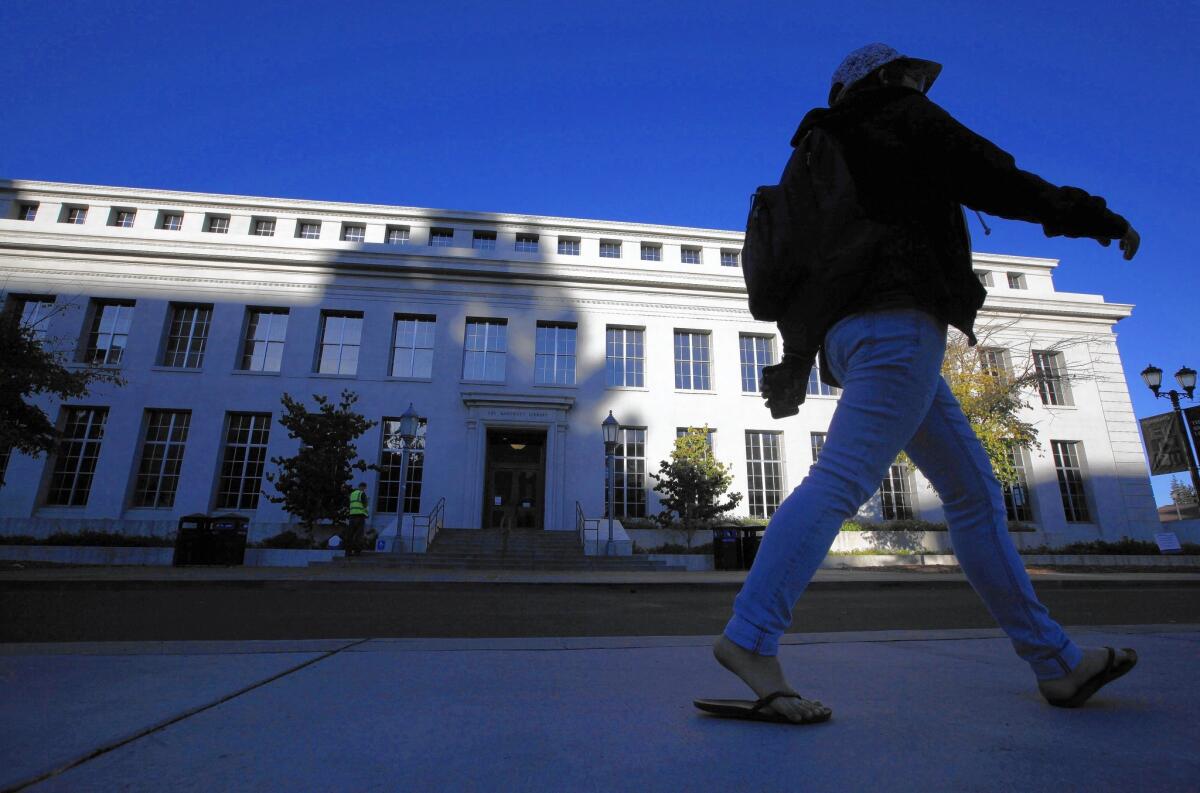New changes in elite college application process raise questions of fairness

- Share via
Whether justified or not, students and families often view admission to a prestigious college as a ticket to a better life.
So it is not surprising that many aspects of the application process — such as testing, alumni ties, access to Advanced Placement courses and affirmative action for minority students — long have provoked debate about fairness.
Two recent developments have provoked similar discussions.
UC Berkeley said it will break UC system tradition and seek recommendation letters from some of this year’s applicants and make it an option for all next year. Also, a coalition of 83 elite colleges and universities established a joint online application portal that will allow students to store term papers and video projects as early as ninth grade for possible later review by colleges.
Backers say both initiatives can help students — particularly low-income or from families with no college experience — who might be lost in the application crunch. But critics say they fear the changes could provide more advantages to students at high schools with ample counseling staff and from families who know how to work the system.
The discussions come amid heightening anxiety about the overall application system.
Applying to competitive colleges long has been a stressful process but has taken on added weight since the Great Recession hit seven years ago, said Jerome Lucido, executive director of the USC Center for Enrollment Research, Policy and Practice, a think tank that studies admissions issues.
“I think families are more concerned about gold plating their children with the right college and university. They perceive it will ensure the financial future of their children and family,” Lucido said.
The Times’ new education initiative to inform parents, educators and students across California >>
The new online application portal will include Ivy League campuses, Stanford, Caltech and other public and private schools (but not UC or USC) that offer substantial financial aid and have high graduation rates.
It will be an alternative to the much larger Common Application. Most colleges in the new Coalition for Access, Affordability and Success will continue to accept the Common Application.
Some critics say the new website is designed to be a more efficient recruiting tool and will become preferred by students focused only on elite schools, while cutting them off from choices.
Coalition officials counter that their goal is to attract a wider pool of applicants, especially low-income students, with the assurances that the private schools will try to meet financial needs and the publics will charge in-state tuition.
A group of counselors from Jesuit high schools has challenged the new portal, complaining that encouraging ninth-graders to start putting writings, videos and artwork in the portfolio locker is too early and will extend anxiety about college.
“I believe it only serves to up the stress for everyone,” said Katy Murphy, college counseling director at Bellarmine College Preparatory high school in San Jose and a co-author of the protest document. The locker shouldn’t be available until 11th grade, the group says.
Coalition board member Audrey Smith, vice president for enrollment at Smith College in Massachusetts, said the portfolio lockers are intended to reduce stress by allowing students to “park” material without a last-minute scramble and give them a chance to reflect on their personal development.
“Ninth grade is way too young to be obsessed about college,” she said, but students that age should be aware of which courses they need to complete the curriculum colleges want.
The coalition plans to start accepting applications in summer 2016, despite counselors’ calls for a year’s delay. But it has postponed when students can start to explore it from January 2016 until April.
Berkeley’s proposal to ask for two recommendation letters, including one from a teacher, is controversial across UC’s nine undergraduate campuses.
Berkeley originally sought to invite, but not require, all applicants to do so in the current cycle for fall 2016 admissions, but criticism led to scaling the plan down to a sample of students, perhaps about 20%, officials said. The campus still intends to widen it to all applicants for fall 2017.
Other UC admissions offices, including UCLA’s, contend that such a request from a single campus will be confusing because all nine use the same online application. And they say that students at large public high schools might not be able to get letters from overburdened teachers and counselors.
Berkeley administrators say such letters could aid students whose own personal essays did not receive editing from parents or even paid consultants and did not reveal their academic and leadership potential in the way a note from an informed adult might.
Whether it’s recommendations or new online applications, students and parents are sure to pay attention to such changes, said USC’s Lucido. To families, he said, the paramount issue remains: “How can I help my students navigate this and get to a good conclusion?”
Twitter: @larrygordonlat
ALSO
Cal State panel proposes annual tuition hikes of about 2%
A decade of academic progress halts, NAEP standardized test scores show
L.A. Unified again fires attorney who blamed student for having sex with teacher
More to Read
Sign up for Essential California
The most important California stories and recommendations in your inbox every morning.
You may occasionally receive promotional content from the Los Angeles Times.











